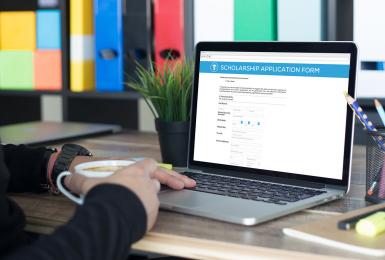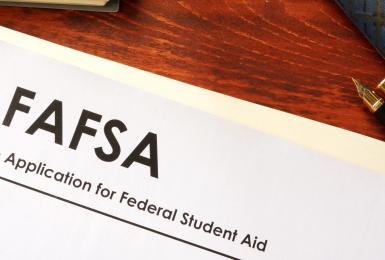As you begin your journey towards obtaining your degree, whether it's a bachelor's or a master's, your first degree or your third, or online or on-campus, you'll quickly discover that determining how you are going to pay for your education is one of the biggest decisions (and challenges) you'll face. While there are a plethora of financial aid options available to students, one of the most common - and the most confusing - is the student loan.
Despite being so widely used, many people don't really understand student loans, which leads to students taking on excessive debt, repaying more each month than they can afford, or missing out on opportunities to secure loans with better terms and interest rates. Because there's so much variability, it's important to have a clear sense of how student loans work before taking on debt.
In this blog post, we're covering some student loan basics to help you make smart decisions when it comes to financing your education, focusing on the difference between federal and private student loans, and how to apply for student loans. Remember, there's a lot of information about student loans we're not covering here, and the best way to understand your options is to have a conversation with your school's financial aid office.
Federal vs. Private Student Loans
While you might think that a loan is simply a loan, there are actually two types that vary significantly from one another: federal and private. Chances are, you've heard these terms being used in conversation, but if you're still wondering what the difference between federal and private loans is, we'll break down what each type consists of.
Federal Student Loans
The U.S. Department of Education offers several federal student loan programs, with the Direct Loan Program being the largest and most widely-used. This program offers multiple loan options to students, based on degree level and financial need. Loans are also available to parents of dependent undergraduate students and to those who do not demonstrate financial need.
Federal loans do have limits: undergraduate students can borrow between $5,500 and $12,500 per year in Direct Loans, and graduate students can borrow up to $20,500, depending on a number of factors. There are also lifetime loan limits, which may affect your eligibility depending on how many degrees you have pursued or institutions you have enrolled in.
Federal student loans are a good option for many students, as they offer a way to cover the cost of education at relatively low, fixed interest rates. Additionally, federal student loans typically offer flexibility when it comes to repayment options, making it easier for students to afford their monthly payments through deferral or income-based repayment, and offer subsidization to many students, which means that interest on the loan will be paid for while students are enrolled in school. Interest on student loans is also tax deductible, which is of particular benefit to adult students with full-time employment.
However, it's important to carefully consider how much debt you are comfortable taking on. You will be responsible for paying back the full amount you borrow - so just because you are approved to borrow a certain amount doesn't mean you have to use it all! Many students don't think about how quickly loans can add up, and how significantly they can impact future finances. Do some calculations to determine how much you can afford to repay based on your actual or projected income, and let that number guide you when making your loan-related decisions.
You can learn more about federal loans, including your eligibility for certain programs, on the Federal Student Aid website.
Private Loans
Private student loans, as the name implies, are granted by private lending institutions, such as banks, credit unions, or state agencies. In general, students should only consider private loans as a supplement to federal loans and other financial aid, as private loans are less regulated and tend to cost more to the student over the long term.
Private loans do not come with subsidization programs, as many federal loans do, and typically have significantly higher or variable interest rates, which means that the student could end up paying back far more than they borrowed over the life of the loan. These loans are also not eligible for the repayment plans offered by the government, meaning that, in most cases, you will be responsible for sticking to a fixed repayment schedule from the moment you graduate - and the monthly payment owed is often much higher than students realize. Private student loan interest is also not tax-deductible.
Additionally, whereas federal aid is available to all students regardless of their credit history or income, private lending institutions will almost always need to see an established credit record in order to grant a loan, and your credit score will affect your interest rate. In some cases, you may need a cosigner to help ensure that the loan will be repaid. This presents a significant obstacle to students with poor credit.
However, the reality is that federal loans will usually not cover the full cost of a student's education, and most students will need to find an additional source of aid. While students should try to explore all other options first, if used sparingly, private loans are an important resource to help students meet their educational goals. To make sure you are borrowing from a reliable source and getting the best possible rate, use a trusted loan comparison site, such as Credible, to explore your options.
How Interest Works for Student Loans
Understanding how interest accrues on your student loan is a crucial part of managing your student loan debt. When you take out a loan, you're essentially borrowing money, and the lender charges you a fee for this service. This fee is known as interest, and it's typically expressed as an annual percentage rate.
Several factors can influence the interest rate on your student loan, including the type of loan (federal or private), your credit history (for private lender loans), and prevailing economic conditions. It's important to note that interest can be either fixed, meaning it stays the same over the life of the loan, or variable, meaning it can change based on market fluctuations.
The way interest is calculated can also vary. Often, it's calculated daily based on the outstanding total amount of your student loan balance. As you make loan payments, a portion goes toward covering the accrued interest, and the rest reduces the principal balance. In the early stages of student loan repayment, a larger percentage of your payment might go toward interest payments.
Applying For Student Loans
Anyone who is interested in taking out a student loan, and is wondering how to qualify for student loans, should begin by filling out the FAFSA, or the Federal Application for Federal Student Aid. The FAFSA collects a wide range of information about your income, based on your tax return from two years prior. The application will be used to determine your eligibility for aid, and can be sent to directly to the schools you're applying to.
The application process for private loans will vary depending on the institution, but the information they require will likely consist of much of the same information you'll be providing on the FAFSA.
It is usually recommended that you spend some time using a free online loan calculator to help you clearly understand what your monthly payments will be based on the amount you're planning to take out, and what salary you'll need to be making in order to afford those payments.
When should I apply for student loans?
You should begin the student loan process as early as possible - ideally, even before you submit your applications to the colleges you're interested in. That way, you can have the financial aid and admissions process going at the same time, and when you're accepted, you'll have a better sense of your financial aid status and can make a more informed decision about whether to accept your offer (or whether you'll need to pursue additional funding sources).
Student Loan Repayment Options
Navigating student loan repayment can feel overwhelming, but understanding your options is key to finding a plan that works for your financial situation. For federal student loans, several income-driven repayment (IDR) plans are available. These plans calculate your monthly payment based on your income and family size and can potentially lead to student loan forgiveness after a certain period of qualifying payments.
Standard repayment plans for federal loans typically involve fixed monthly loan payments over a period of 10 years. Graduated repayment plans start with lower payments that gradually increase over time. Extended repayment plans allow you to stretch your payments over a longer period, potentially reducing your monthly payment but increasing the total amount of interest you pay over the life of the loan.
If you have private lender student loans, your student loan repayment options will depend on the specific lender. These may include fixed or variable interest rates and various repayment terms. It's essential to communicate with your student loan providers if you're facing difficulties making your loan payments to explore potential solutions. Understanding the terms and conditions of your student loan agreement is crucial, regardless of whether it's a federal or private loan.
FAQs About Student Loans
Now that you know the types of student loans you can take out, and how to apply for them, you're well-positioned to begin the financial aid process. However, you likely still have other questions about student loans.
How much will I be required to pay back every month?
Your monthly student loan payment depends on the total amount borrowed, the interest rate, and your repayment plan. Federal loans offer options like standard (fixed payments over 10 years) and income-driven repayment (IDR) plans, where payments are based on your income and family size. Private lender loan payments are determined by your loan terms. Using a student loan repayment calculator from your student loan providers can help you estimate these amounts.
When does interest begin accumulating on my loan?
For most federal student loans, interest starts accruing as soon as the funds are disbursed, although Direct Subsidized Loans have interest paid by the government during certain periods. Private lender student loans typically also begin accruing interest upon disbursement. Understanding when interest starts helps you track the total amount you'll owe over time. Always review your loan agreement for specific details.
When do you pay back student loans?
Repayment for federal student loans usually begins after a six-month grace period following graduation, leaving school, or dropping below half-time enrollment. Private lender student loans may have different repayment terms, sometimes requiring payments while still in school or offering a similar grace period. Check your private lender loan agreement to know your specific repayment start date to avoid missed loan payments.
What happens if I can't afford my monthly payment?
If you can't afford your monthly loan payments, contact your student loan providers immediately. For federal loans, explore income-driven repayment (IDR) plans or options like deferment or forbearance, which can temporarily adjust your payments. Private lender options vary, so proactive communication is key to finding potential solutions and avoiding default and negative impacts on your credit score.
How long will it take for me to pay off my loan?
The payoff timeline for your student loan depends on your chosen student loan repayment plan and the total amount borrowed. Standard federal plans are 10 years, while extended and income-driven plans can range from 20 to 25 years, potentially including student loan forgiveness at the end. Private lender loan terms vary; making extra payments can shorten your repayment period and reduce the total amount of interest paid.
Are there other financial aid opportunities available that might offset the amount I'll need to borrow in loans?
Yes, explore grants (need-based aid that doesn't need repayment), scholarships (often merit-based), work-study programs, and institutional aid from colleges like Champlain College Online. Completing the Free Application for Federal Student Aid (FAFSA) is crucial for federal aid. Actively seeking these opportunities can significantly reduce the total amount you need to borrow in student loans and minimize future student loan debt.
And remember - it's important that you have a conversation with your school's financial aid office to get the answers you need before you commit to a loan.
Ready to Invest in Your Educational and Professional Future?
Understanding the ins and outs of student loans is a significant step toward achieving your educational goals. At Champlain College Online, we're committed to providing accessible and flexible online degree programs designed to fit your life.
Explore the diverse range of online degree and certificate programs offered at Champlain College Online and discover how we can help you gain the skills and knowledge you need to succeed. Check them out or reach out to our Admissions team today with any questions you may have!
Request Information
Connect with our admissions team to learn more about Champlain College Online.

Request Information
I acknowledge that, by clicking the "submit" button, I am giving my express written consent to Champlain College and its representatives to contact me about educational opportunities via email, text, or phone, at the phone number above, including my mobile phone, using an automatic dialer, or pre-recorded message. Message and data rates may apply. I understand that my consent is not a requirement for enrollment, and I may withdraw my consent at any time.






